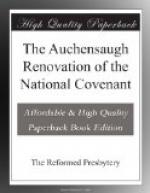Ans. Certainly the obligations of the Covenant, held forth Deut. xxix. 10, 11, 12, being so extensive as to reach all the members of church and commonwealth, of all qualities, ranks, vocations, ages, sexes; is to be understood positively, that all these are obliged to enter into covenant, but not negatively, that without any of these the covenant should not be entered into. The motives mentioned are to the small as well as to the great; and without them as well as with them; the articles of it, and the keeping and doing them, are common to both alike: The relation that the small and meaner sort of people have to God (the other contracting party) is the same that the nobles and great ones have, and the privileges of it, to be established as a people unto himself and to have him for their God, do no more belong to the one than the other; And consequently the small may renew it, as well as the great; but not nationally to bind the whole nation formally, to which indeed the concurrence of the representatives is necessary. As for precedents of this practice, see them above, in the narrative of the sermons, [p. 9].
Object. 2. “This covenant having been disclaimed by the political father, and made void by law, never again revived by authority of parliament, nor the law rescinded by which it was declared not obligatory; is therefore of no binding force upon us, who have never personally sworn it; and to renew it, and bring ourselves under the bond of it, when we are free, without the concurring or imposing authority of our rulers, is high presumption in private subjects.”
Ans. If any engagements can be supposed binding to posterity, certainly national covenants to keep the commandments of God, and to adhere to his institutions, must be of that nature. It cannot be denied, that several obligations do bind to posterity; such as public promises with annexation of curses to breakers, Neh. v. 12, 13. Thus Joshua’s adjuration did oblige all posterity never to build Jericho, Josh. vi. 26. And the breach of it did bring the curse upon Hiel the Bethelite, in the days of Ahab. 2dly, Public vows: Jacob’s vow, Gen. xxviii. 21, did oblige all his posterity, virtually comprehended in him, Hos. xii. 4. The Rechabites found themselves obliged to observe the vow of their forefather Jonadab, Jer. xxxv. 6, 14, for which they were rewarded and commended. Public oaths do oblige posterity: Joseph took an oath of the children of Israel, to carry up his bones to Canaan, Gen. i. 25, which did oblige posterity some hundred years after. Exod. xiii 19. Josh. xxiv. 32. National covenants with men before God, do oblige posterity, as Israel’s covenant with the Gibeonites, Josh. ix. 15, 19. The breach whereof was punished in the days of David, 2 Sam. xxi. 1. Especially National Covenants with God, before men, about things moral and objectively obliging, are perpetual; and yet more especially (as Grotius observes) when they are of an hereditary nature, i.e. when the subject is permanent, the matter moral, the end good, and in the form there is a clause expressing their perpetuity.




